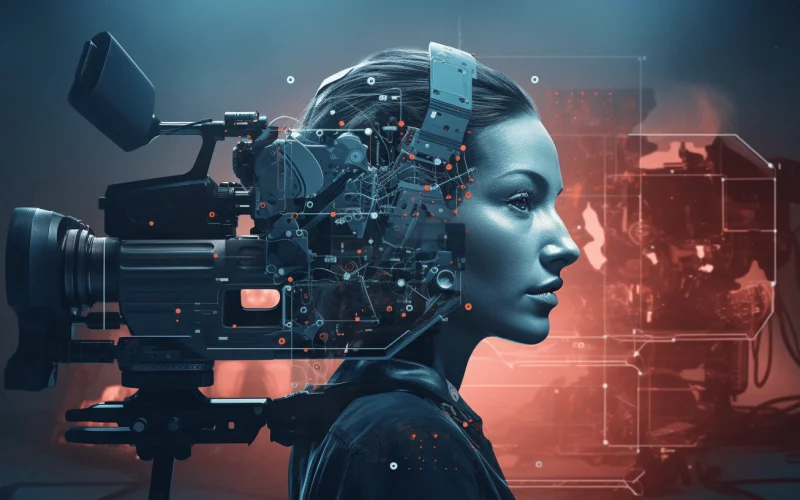Introduction
In the fast-evolving world of cinema, predicting the performance of a film is increasingly complex. Traditional methods such as market research, audience surveys, and box office tracking have served the industry well for decades. However, with the rapid advancement of technology, Artificial Intelligence (AI) has emerged as a powerful tool in predicting film success. By leveraging vast amounts of data, AI systems are capable of making predictions with a high degree of accuracy, offering new insights into factors that drive a film’s performance. This article explores how AI is transforming the way we predict film success and how its role is shaping the future of the entertainment industry.
The Rise of AI in Film Industry Predictions

Historically, predicting the success of a film was more of an art than a science. Studios and filmmakers often relied on instincts, gut feelings, and traditional market trends. However, AI offers an opportunity to shift from subjective decisions to data-driven predictions. By analyzing vast datasets, AI can identify patterns that human experts might miss, providing filmmakers and studios with valuable insights into what works and what doesn’t.
AI tools today collect and analyze data from a variety of sources, including social media, past film performances, viewer demographics, and even real-time reactions to trailers. Machine learning models, a subset of AI, are particularly effective in processing these vast datasets and learning from them. Over time, these models become better at predicting how a film will perform at the box office, what kind of audience it will attract, and even how it will perform in terms of streaming and home entertainment sales.
The Role of AI in Predicting Film Success
AI plays a major role in helping predict a film’s success. By analyzing social media buzz, past box office data, and audience reactions, AI systems can estimate how much a movie might earn. These predictions help studios plan their budgets, set marketing goals, and even decide on the release format. AI also helps filmmakers understand which genres, themes, or actors are likely to attract the most viewers.
How AI Predicts Film Performance

AI predicts film performance through sophisticated algorithms and machine learning models. These systems are trained using data from multiple variables, including:
- Social Media Trends: AI can analyze buzz, hashtags, and audience discussions across platforms like Twitter, Facebook, and Instagram. A film’s level of social media engagement is a significant predictor of its future performance.
- Audience Demographics: AI systems also take into account demographic data such as age, gender, location, and viewing habits. Understanding who is most likely to watch a film allows filmmakers to better target their marketing strategies.
- Historical Box Office Data: Previous box office performance is a strong indicator of how future films may perform. By comparing a film’s characteristics (e.g., genre, cast, director) to past hits or flops, AI can forecast potential earnings.
- Trailer Reactions: Early reactions to a film’s trailer provide valuable predictive data. AI can measure engagement levels, likes, and shares to gauge audience interest even before the film is released.
- Streaming Trends: In the digital age, streaming platforms have become a major part of film consumption. AI can analyze data from services like Netflix and Amazon Prime to determine the likelihood of a film being popular on these platforms after its theatrical release.
AI’s Impact on Marketing Strategies

AI’s role extends beyond film predictions into marketing and distribution. By predicting a film’s performance across different demographics and regions, AI can help studios develop more targeted advertising campaigns. For example, if a particular demographic group is most likely to watch a certain type of movie, AI can help ensure the marketing dollars are directed toward that group, optimizing the campaign’s return on investment.
Additionally, AI helps optimize film release strategies. For instance, it can predict whether a film should be released in multiple formats (theater, streaming, DVD) or if it would be better to debut directly on digital platforms. This data-driven approach can maximize a film’s profitability, whether it’s through box office sales or digital revenue streams.
How AI Analyzes Social Media Data

One of the key ways AI predicts film performance is by analyzing social media activity. Social media platforms like Twitter, Instagram, and Facebook provide a lot of information about how excited people are for a movie. AI can track how often people talk about a film, how much they engage with posts, and how many shares or likes a trailer gets. These patterns give a good idea of whether the public is interested in the movie. If a film’s social media buzz is strong, it often means the movie will perform well at the box office.
AI Helps in Targeting the Right Audience
AI is especially helpful in identifying the right audience for a film. By analyzing viewer demographics such as age, gender, and location, AI can predict who is most likely to watch a movie. This helps studios target their marketing more effectively. For example, if AI shows that a particular genre is popular among younger viewers, the marketing campaign can focus more on that age group. This ability to pinpoint the audience is a big advantage because it allows studios to spend their marketing budget more wisely.
Improving Film Marketing Campaigns

Marketing is a huge part of a film’s success, and AI is playing a bigger role in improving these campaigns. With AI, studios can analyze the best times to release trailers, the best platforms to promote the film, and even the type of ads that will catch the most attention. AI can predict which marketing strategies are most likely to get a movie noticed, increasing the chances of a successful launch. This data-driven approach helps studios make smarter decisions and avoid wasting money on ineffective promotions.
The Growing Influence of AI in Streaming Predictions
As streaming platforms like Netflix and Amazon Prime become more popular, AI is also being used to predict a film’s performance on these services. AI can track viewing habits on streaming platforms, such as what kinds of movies people watch, how long they watch, and when they stop watching. This data allows AI to predict whether a film will be popular on streaming platforms after its theater release. Streaming predictions are becoming more important because many films are now released on digital platforms at the same time as in theaters.
AI’s Role in Adjusting Film Strategies in Real-Time

In the future, AI might be able to help filmmakers make changes to a film even after it’s been released. For example, AI could analyze audience reactions and suggest improvements or changes to the marketing campaign. If a trailer isn’t performing well, AI might suggest ways to tweak it for better results. Additionally, if certain scenes in a movie aren’t resonating with audiences, AI could flag this early on, allowing filmmakers to make adjustments for future releases. This level of flexibility and real-time analysis is one of the most exciting possibilities for AI in the film industry.
Challenges and Limitations of AI in Film Performance Prediction
While AI has proven to be an invaluable tool, it’s not without its limitations. One of the primary challenges lies in the quality and availability of data. AI predictions are only as good as the data fed into them. Inaccurate, incomplete, or biased data can lead to faulty predictions. Moreover, predicting film performance is inherently difficult because of the unpredictable nature of audience preferences. Even with accurate data, a film’s success can still hinge on unforeseen factors, such as cultural trends, word of mouth, or critical reviews.
Another limitation is the lack of creativity and intuition in AI models. While AI can analyze past data and predict trends, it cannot replicate the human touch that often drives cinematic success. Certain films, like cult classics or surprise hits, defy AI predictions due to their unique cultural impact or originality.
Future of AI in Film Predictions

As AI technology continues to evolve, so too will its ability to predict film performance. The future of AI in the entertainment industry likely involves even deeper integrations with other aspects of filmmaking. For instance, AI could assist in script development by analyzing which types of stories and plot structures are most successful at the box office. Similarly, AI could be used to help filmmakers make decisions about casting by analyzing which actors are most likely to drive a film’s success based on past performances.
Furthermore, AI may eventually be used to predict audience reactions to specific scenes or storylines, allowing filmmakers to adjust their work during the production process. With these advancements, AI will play an even more crucial role in not only predicting but also shaping the success of films.
Comparative Analysis of Traditional Methods vs AI in Film Performance Prediction
| Method | Strengths | Weaknesses | Accuracy |
|---|---|---|---|
| Traditional Market Research | Relies on human insights and experience | Subjective, costly, and time-consuming | Low accuracy due to biases |
| AI Predicting Film Performance | Data-driven, faster, and scalable | Data-dependent, lacks creative intuition | High accuracy in trends and patterns |
Analysis Table: Key Factors in AI Predicting Film Performance
| Factor | Impact on Prediction | Example |
|---|---|---|
| Social Media Buzz | Strong predictor of audience interest | A surge in Twitter mentions before a film’s release often predicts a box office hit |
| Audience Demographics | Helps tailor marketing strategies | Films targeting younger audiences often perform better on platforms like TikTok |
| Historical Performance | Provides a baseline for predictions | Action films starring popular actors typically do well based on past data |
| Trailer Engagement | Indicates early interest and engagement | Films with high YouTube views and shares tend to perform well |
Conclusion
AI is undoubtedly revolutionizing the way the film industry predicts performance, offering a new level of precision and insight. By analyzing a wide array of data from social media trends to audience demographics AI provides filmmakers and studios with invaluable tools to predict box office success, target marketing strategies, and optimize release strategies. While there are still limitations to consider, the role of AI in film predictions will only continue to grow as technology advances, shaping the future of the entertainment industry.












